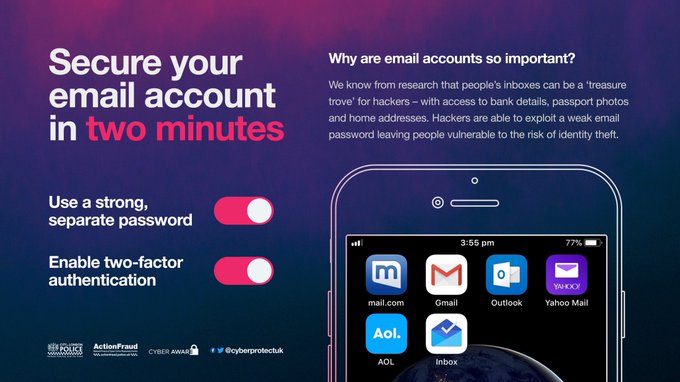
Intelligencia Training raise intelligence skills within local authorities
October 22, 2018
Vanquis Bank and Intelligencia Training build on success
November 8, 2018Cyber Aware is warning the public that without using a strong and separate password for your main email account, you risk giving cybercriminals a wealth of information that could be used against you.
This comes after research from UK General Insurance in partnership with Cyber Aware reveals that people are storing sensitive information within their email accounts. 51% of people store e-receipts revealing purchase history, 34% store personal photos of friends, family or pets and 6% have love letters saved in their inbox.
Storing this kind of information can be like ‘gold dust’ to criminals, who can use it to commit cyber crime including making phishing emails more convincing by including personal information or impersonating you or friends and family.
National Cybercrime Programme Lead, Detective Superintendent Andrew Gould from the National Police Chiefs’ Council said: “Just imagine someone posing as you and the reputational, emotional and financial damage it could do to you and your loved ones. The Cyber Aware campaign wants to make people really think about the value of our inboxes and treat them in the same way we treat treasured possessions in the offline world, by taking the simple step of having a strong and separate email password, by using three random words and adding special characters and numbers to make it stronger. For an added layer of protection, we recommend using two-factor authentication on your email account, if available. This means your account can only be accessed with a device you have already registered.”
Alison Marriott, a victim of hacking said: “The whole experience was very distressing. emails were being sent from my account to my contacts which I had no control over. It caused a great deal of embarrassment as there were lots of phone calls to be made to explain the situation. It was also very inconvenient and took days to sort out.”
Cyber Aware has released the following tips as part of its #OneReset awareness campaign:
- Use a strong, separate password for your email.
- A good way to create a strong and memorable password is to use three random words. Numbers and symbols can be used to make it stronger.
- Use words which are memorable to you, but not easy for other people to guess. Don’t use words such as your child’s name or favourite sports team which are easy for people to guess by looking at your social media accounts or simple substitutions like ‘Pa55word!’.
- When available you should use two-factor authentication (2FA) on your email account. It gives it extra layer of security, as it means your account can only be accessed on a device that you have already registered.
- Don’t use public Wi-Fi to transfer sensitive information such as card details
Author: Action Fraud
Article Source/Credit: https://www.actionfraud.police.uk/blog/is-your-email-account-secure



